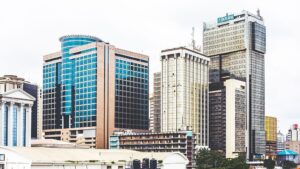Over the last four years, the Lagos State government has prioritized infrastructure development as a key pillar of its strategic development agenda. The focus on infrastructure provision is driven by the need to fulfill the ‘Greater Lagos’ mandate and promote a greener future.
Despite the long way to go, there have been significant achievements in upgrading and rehabilitating over 1,000 junction and community roads, constructing more than 100 link roads, flyovers, and bridges, and commissioning 15 new ferries, including the Ishefun Jetty, linking Lagos to Ogun State. The first phase of the 27-km Lagos Blue Rail Line covering 13 km with five stations running from Marina to Mile 2 has also been commissioned, providing faster and more efficient transportation.
One of the recent priorities of the Lagos State government is addressing the severe flooding experienced in parts of Lagos in 2022. The government has identified areas where infrastructure upgrades are needed and has increased the residential stock, particularly in low-middle-income areas. The Ibeju-Lekki area is experiencing a lot of activities in terms of housing and infrastructure, thanks to the recent upgrade of the 2-lane 18.7km Eleko-Epe expressway into a 6-lane carriageway.
The expansion is expected to drive up land prices in the area, as more developers embrace the continuity of their projects. The $2.5Bn Lagos 4th Mainland Bridge project, which was awarded to Messrs CCECC-CRCCIG Consortium, is also expected to promote accessibility along the Lekki-Epe corridor, serving as an allure for deepened commercialization and higher property values. The project is slated for completion by 2027.
The Lagos-Badagry expressway, which now nears completion covering Nigeria’s section of the Trans-West Africa Coastal Highway linking Dakar, Senegal, is another critical infrastructure project. Once completed, it will reduce rush hour periods for commuters and workers plying the highway.
Lagos ports remain a cornerstone of the Nigerian economy, accommodating over 70% of Nigeria’s imports and significantly contributing to the nation’s GDP. The newly commissioned $1.5Bn Lekki Deep Seaport aims to decongest the Apapa port and serve as a central hub for passenger and cargo traffic. However, the movement of heavy-duty cargo-carrying trucks en route to the Dangote refinery and the entire Lekki Free Trade Zone remains a significant concern for those living and working in the Lekki-Epe corridor.
The makeover of one of Lagos’s cultural hubs, the JK Randle Center, has become essential for positioning Lagos as an enterprise city. The center offers a 1,000 sqm exhibition gallery, an outdoor theater, and learning spaces, among other features, sitting on 11,000 sqm of land. The rebirth of the JK Randle Center is a step towards reawakening the city’s nightlife, music, and general entertainment, ultimately boosting the state’s revenues.
In conclusion, the Lagos State government’s focus on infrastructure development is critical to achieving its mandate of building a greater, greener future for Lagos. The completion of ongoing infrastructure projects and the commissioning of new ones will positively impact transportation, property values, and business activities in the state, and ultimately lead to improved living standards for Lagosians.




